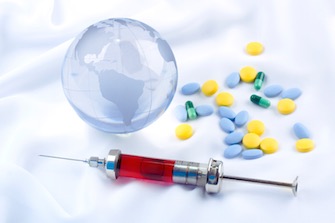“[The C-TAP Initiative] provides an approach to collaboration that is voluntary, and voluntary is critical. It should not be used to suggest that IP protections are in any way a barrier to addressing COVID-19. In fact, what we’re witnessing today strongly shows that the opposite is true.” – Hans Sauer, BIO
 On Friday, May 29, the World Health Organization (WHO) officially launched the COVID-19 Technology Access Pool (C-TAP), an initiative which is intended to improve access to treatments, vaccines and other medical technologies which are developed in response to the global COVID-19 pandemic. The program, initially proposed by Costa Rica, has highlighted the tension between pharmaceutical developers and advocates for access to medicine, which has been magnified by the economic concerns created during the global shutdown. The announcement came the same day that U.S. President Donald Trump vowed to cut ties with WHO.
On Friday, May 29, the World Health Organization (WHO) officially launched the COVID-19 Technology Access Pool (C-TAP), an initiative which is intended to improve access to treatments, vaccines and other medical technologies which are developed in response to the global COVID-19 pandemic. The program, initially proposed by Costa Rica, has highlighted the tension between pharmaceutical developers and advocates for access to medicine, which has been magnified by the economic concerns created during the global shutdown. The announcement came the same day that U.S. President Donald Trump vowed to cut ties with WHO.
WHO Issues Call for Solidarity on Open Technology Access
In a press release issued Friday, WHO stated that the technology pool is meant to ensure better access to existing and new COVID-19 health products through five elements:
- public disclosure of gene sequences and data;
- transparent clinical trial publications;
- funding agreement clauses on availability and trial data publication;
- promoting the licensing of related technologies to the UN’s Medicines Patent Pool (MPP); and
- promoting open innovation models and technology transfer.
Countries officially supporting the WHO COVID-19 initiative at its launch include Argentina, Belgium, Brazil, Egypt, Indonesia, Mexico, Norway, Pakistan, Portugal, South Africa and the Netherlands.
Supporters of the technology platform, which is designed to facilitate global nonexclusive voluntary licensing schemes, tout the need to respond to the pandemic with the ability to quickly deliver innovation at scale throughout the world. “Traditional market models will not deliver at the scale needed to cover the entire globe,” said WHO Director-General Dr. Tedros Adhanom Ghebreyesus. “Solidarity within and between countries and the private sector is essential if we are to overcome these difficult times.”
Technology Pool Sparks Industry Criticism While Avoiding Other Access Issues
The suggestion that intellectual property poses the greatest barrier to access to treatments for COVID-19 conflicts squarely with recent comments from other world leaders. “[T]here does not appear to be any evidence that IP is a barrier to access to vital medical preventative measures, such as vaccines, or to treatments or cures,” said Francis Gurry, Director General of the World Intellectual Property Organization (WIPO), in late April. Gurry noted that, while there were many existing barriers to access that should be addressed, any barriers posed by IP can be solved through existing international agreements. The WIPO Director argued that governments should instead be pursuing policies to incentivize scientific innovation through strong IP rights, which would more effectively address the world’s lack of a vaccine to control COVID-19.
Within the pharmaceutical industry, there is a good deal of concern about voluntary or even compulsory patent licensing schemes that some nations have contemplated as a part of the global response to COVID-19. The day before WHO’s C-TAP platform was launched, a number of top executives from pharmaceutical firms including Pfizer, AstraZeneca and GlaxoSmithKline made remarks questioning the initiative at an online forum coordinated by the International Federation of Pharmaceutical Manufacturers & Associations (IFPMA). While many WHO member nations seem supportive of the initiative and its corresponding open access resolution, the U.S., UK and Switzerland have each reportedly opposed WHO’s platform.
It seems fair to question why WHO would take the lead in developing the C-TAP technology pool initiative given the fact that WIPO, the UN agency in charge of international IP matters, has found that current IP systems are no barrier to access. The negative comments from pharmaceutical executives indicate that the program has been developed with little input from the private sector stakeholders who are being called upon to produce innovations at a time of crisis, while facing the possibility that those health technologies will be subject to open access agreements. Encouraging governments to address more pressing access concerns, such as delays in regulatory approvals and unnecessary supply chain barriers, could more effectively ensure that COVID-19 treatments become widely available once they are developed.
Protecting IP Rights While Navigating Technology Pooling Agreements
Patent pooling initiatives such as C-TAP have important competing interests between open access and research and development which should be carefully balanced, notes Steve Shape, Managing Partner at Dennemeyer. “It would be a benefit to have firms contribute for a specific period of time under a template agreement that provides some opportunity to monetize technologies as things improve,” Shape said. While patent owners need to be careful in protecting their rights through such arrangements, pharmaceutical trade secrets present an additional set of concerns in maintaining confidentiality despite participating in technology pools. “It’s possible you could do so under a very strict set of parameters,” Shape said, “but you still run the risk of a trade secret getting outside of a limited scope group.”
Patent owners who have to navigate contractual issues involving such open access agreements could pursue a few avenues through which they could protect their interests in commercializing their R&D. Shape suggested tailored documentation governing contributions to the pool and licensing periods for technologies covering specific uses of those technologies as useful elements that can be accomplished in negotiations. He also suggested the possibility of contracting for larger royalty rates after the pandemic as a useful trade-off for sacrificing earlier profits. “There’s going to be a point in time where a treatment is successful, and there could be some recognition of that contribution at a higher royalty rate than there otherwise would have been after an initial term of free or compulsory contribution,” Shape said.
Industry Reacts
The following comments regarding WHO’s C-TAP initiative were offered by leaders of pharmaceutical trade associations:
 Hans Sauer, Deputy General Counsel and Vice President for Intellectual Property, Biotechnology Innovation Organization (BIO)
Hans Sauer, Deputy General Counsel and Vice President for Intellectual Property, Biotechnology Innovation Organization (BIO)
This platform provides an approach to collaboration that is voluntary, and voluntary is critical. It should not be used to suggest that IP protections are in any way a barrier to addressing COVID-19. In fact, what we’re witnessing today strongly shows that the opposite is true. The robust response to the pandemic, characterized by rapid partnering and collaboration, demonstrates that IP facilitates progress, rather than impedes it. Any platform that becomes coercive or compulsory would undermine collaboration and hinder our ability to eradicate this deadly disease. It is also important to recognize that optimal licensing strategies are going to be different depending on the kind of product, its stage of development, a given country’s needs and capacities, and many other factors. This means that we must take care to avoid one-size-fits-all solutions. For example, calls for global, nonexclusive, and indiscriminate licensing may in many instances not correspond with the real-world problems we are urgently working to solve.
Our members are interested in eradicating COVID-19 as quickly as possible. We are seeing unprecedented collaboration across the industry. Larger pharmaceutical companies and smaller biotechnology companies are coming together at a rapid pace to share ideas, technologies and resources. We must also keep in mind that there are many multilateral public-private collaboration initiatives underway in which our companies are already participating, such as ACT-A, CEPI, the Medicines Patent Pool and others. We are eager to see whether the new WHO platform has a clear mandate that avoids confusion, duplication, and overlap with such ongoing other initiatives, and whether it adds something that cannot be achieved more efficiently through already-existing platforms. We look forward to this discussion and hope it will play a constructive role in the race to defeat this deadly virus.
Voluntary participation is critical to bolster collaboration and accelerate scientific advancements to end this pandemic. Collaborative research often requires different partners to each contribute their existing proprietary technology, and it often results in new unexpected discoveries. It is important for companies to know upfront how their technologies will be used, and how unexpected new discoveries that might fall outside of COVID-19 applications will be handled. That is why it is often preferable to have some sort of agreement in place between partners who are best-positioned to contribute to clearly-defined collaborations, rather than indiscriminate non-exclusive licensing or open, one-sided pledges.
 Thomas Cueni, Director General, International Federation of Pharmaceutical Manufacturers (IFPMA)
Thomas Cueni, Director General, International Federation of Pharmaceutical Manufacturers (IFPMA)
We have not been included in these negotiations and still have limited understanding of what is being proposed concretely, and how it is different from the various institutions already facilitating sharing of data, know-how and IP. We supported the decision of the Medicines Patent Pool (MPP) to temporarily expand its mandate to include health technologies related to COVID-19, as it adds to the arsenal of options available to companies when establishing access to any potential COVID-19 product. Companies are also already intensively sharing various assets to expedite research in various platforms, such as ACT-Accelerator and ACTIV.
By urging that every technology related to COVID-19 be licensed on a non-exclusive global basis, the initiative promotes a one-size-fits-all model that disregards the specific circumstances of each situation, each product and each country. This may ultimately run counter to its stated objectives of enhancing access to products and cooperation, which we wholeheartedly share.

![[IPWatchdog Logo]](https://ipwatchdog.com/wp-content/themes/IPWatchdog%20-%202023/assets/images/temp/logo-small@2x.png)

![[[Advertisement]]](https://ipwatchdog.com/wp-content/uploads/2023/01/2021-Patent-Practice-on-Demand-1.png)
![[Advertisement]](https://ipwatchdog.com/wp-content/uploads/2024/04/Patent-Litigation-Masters-2024-sidebar-early-bird-ends-Apr-21-last-chance-700x500-1.jpg)

![[Advertisement]](https://ipwatchdog.com/wp-content/uploads/2021/12/WEBINAR-336-x-280-px.png)
![[Advertisement]](https://ipwatchdog.com/wp-content/uploads/2021/12/2021-Patent-Practice-on-Demand-recorded-Feb-2021-336-x-280.jpg)
![[Advertisement]](https://ipwatchdog.com/wp-content/uploads/2021/12/Ad-4-The-Invent-Patent-System™.png)







Join the Discussion
2 comments so far.
Anon
June 1, 2020 05:20 pmA moral obligation to “share widely” may also realize that the BEST WAY to share widely may — per Abraham Lincoln’s words – add the fuel of interest to the fire of genius.
One would be at least thoughtful to pause and wonder what REMOVING the fuel of interest — even if in the name of ‘moral obligation’ would have NOT JUST at critical times, but at all times.
I also think that those who are only too willing to sacrifice liberties (in the aspect of privacy and associated aspects) are more likely than not NOT understanding WHY we have those liberties in the first place.
Over reacting based on emotion — even noble emotions — is NEVER a good thing.
SANDY OESTREICH, 35-year Nurse Practitioner; Prof Emerita; fmr elected official; co-author, internationally distributed pharm. ref. texts
June 1, 2020 01:35 pmToday’s life and thereafter Is at Extreme Risk.There exists a moral obligation to share widely the successful medications, equipment, trends, etc. as possible. How to apply economic gain principles to those companies which have invested expensive time, energy, and brainpower to develop them must be balanced with the need to deal with outcomes of the virus itself. At a time critical like this, I believe that capitalistic patents, privacy matters must be of secondary importance. That said, if done by weighing the human needs more primarily, there can be equanimity struck, perhaps with higher rewards to the inventing scientists at first, and tapering off as the health scene improves globally. What do you think? 6 1 2020